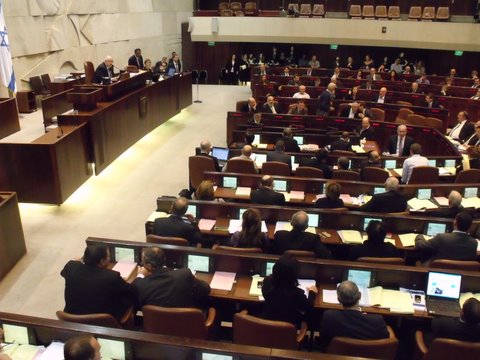Poll#1: Smith conducted a poll of 500 people with a margin of error of 4.5% that was broadcast by Reshet Bet Radio on Sep 4 2016.
Who is in your opinion is responsible for the Shabbat Crisis?
43% Prime Minister Netanyahu, 25% Haredi parties, 19% Transportation Minister Katz, 13% No opinion
In your opinion should the Prime Minister fire or not fire the Transportation Minister Yisrael Katz?
82% Not fire, 18% Fire
Notes: Among those who fault Yisrael Katz for the Shabbat crisis: 53% Not fire, 47% Fire. 43% of Haredim said Katz should be fired. Among Likud voters 76% said don’t fire and 24% said fire. Among Zionist Union voters 13% said fire, 11% of Yesh Atid voters also said he should be fired, just 5% of Meretz voters said Katz should be fired. 10% of Bayit Yehudi voters said Katz should be fired.
Poll #2: HaMidgam Project (formerly Dialog) conducted a poll of 501 people for Walla that was published on Sep 4 2016.
In your opinion who is responsible for the crisis of the train work on the Sabbath?
42% Prime Minister Netanyahu, 27% Haredi parties, 17% Transportation Minister Katz, 11% No opinion, 3% Someone else
Do you support or oppose infrastructure work on trains during the Sabbath?
57% Support, 35% Oppose, 8% no opinion
Notes: 57% of secular Jews blame Netanyahu and 37% of traditional Jews blame Netanyahu. Among religious Jews 40% blame Katz, 19% the Haredi parties and 16% blame Netanyahu. Among Haredim 53% blame Katz, 19% blame Netanyahu and just 6% blame their own Haredi parties.
Among secular Jews 86% support the work on the Sabbath compared to 7% who oppose. Among traditional Jews the level of support is 56%. Among religious Jews 78% oppose the work on the Sabbath and 13% support it. Among Haredim – 100% oppose the work on the Sabbath.
Poll #3: Midgam conducted a poll of 500 people that was broadcast by Channel 2 on Sept 4 2016.
Who is to blame for the Train Crisis?
49% Netanyahu, 21% Both equally, 14% Katz
Should Netanyahu fire Minister Katz?
64% No, 17% Yes
Was Netanyahu’s decision not to have the work done on Shabbat justified?
63% No, 25% Yes
Poll #4: Panels conducted a poll of 502 people with a 4.3% margin of error that was published by Maariv on Sep 5 2016
Would you advise Netanyahu to fire or not fire Minister Yisrael Katz?
62% No, 26% Don’t know, 12% Yes
Note: 62% – number the same among Likud members.
Who do you support in the current working on the Sabbath crisis?
52% Katz, 25% Netanyahu, 23% Don’t know
Note: Among Likud voters 41% support Katz, 32% support Netanyahu & 27% don’t know.
Is the current crisis due to the Sabbath or is it an internal political issue between Netanyahu and Katz?
67% Internal political issue, 21% About the Sabbath crisis, 12% Don’t know.
Note: Among Likud voters 60% think it is an internal political issue, 33% about the Sabbath crisis and 7% didn’t know.
In principle do you support or oppose serious infrastructure work on the Sabbath?
61% Support, 34% Oppose, 5% No opinion
Note: Among Likud voters 58% support working on the Sabbath, 33% oppose and 9% don’t know.
Are you pleased with the way Transportation Minister Katz does his job?
62% Yes, 30% No

